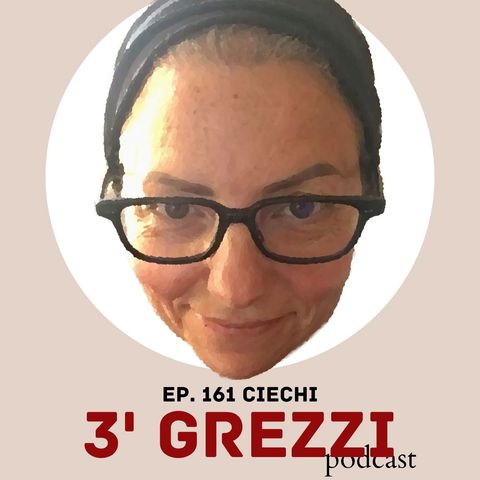3' grezzi Ep. 161 Ciechi

Scarica e ascolta ovunque
Scarica i tuoi episodi preferiti e goditi l'ascolto, ovunque tu sia! Iscriviti o accedi ora per ascoltare offline.
Descrizione
Se usate "non vedente" perché credete che dire "cieco/a" sia offensivo, pensate male. Parliamo delle parole da usare quando si parla di disabilità: io stessa a volte mi pongo il...
mostra di piùLINK
"Parlare di disabilità: quali sono le parole corrette da usare" articolo di Iacopo Melio
https://www.fanpage.it/attualita/parlare-di-disabilita-quali-sono-le-parole-corrette-da-usare
TRASCRIZIONE TESTO [English text below]
Parlare di quello che non si conosce è sempre difficile e pericoloso, diventa però anche offensivo quando ciò che non si conosce è un mondo. Sto pensando al mondo della disabilità. Spesso sento persone che parlano dei ciechi come 'non vedenti'. Io ho cercato di spiegare diverse volte che i ciechi sono ciechi non sono non vedenti. Però c'è questa sensazione che dire cieco sia una cosa offensiva perché purtroppo spesso la parola cieco viene usata (e non solo la parola cieco ma anche altre definizioni di disabilità) vengono usate nel linguaggio comune come insulti: "sei forse cieco?". Ecco è questa la sensazione negativa che si ha all'uso della parola cieco, però questo è un problema nostro, cioè il problema che non dovremmo usare le parole della disabilità come insulti e purtroppo invece ancora si fa troppo spesso. I ciechi sono ciechi non solo non vedenti perché definire qualcuno in negativo come 'che non fa qualcosa che non può fare qualcosa' beh lo vedete pure voi senza bisogno che ve lo spieghi per esteso, non è una cosa bella perché definire qualcuno non vedente significa Io vedente sono il centro, il termine di paragone e tutto il resto del mondo viene visto in relazione a me, a quello che io so fare a quello... e se anche gli altri sanno fare quello che io so fare. Quindi questo numero uno, anche perché è stato decretato anche dall'Organizzazione mondiale della sanità, gli stessi ciechi: l'Unione Italiana Ciechi non è unione non vedenti. Ecco quindi prima di tutto si dice ciechi, non si dice non vedenti. Poi anche altre, altri modi di dire. Io capisco che è difficile però quando non si sa cosa dire basta andare a cercare grazie a dio su internet si trova tutto su Internet. È sbagliato anche dire una persona 'affetta da, malata di' perché non è la persona sia affetta e malata, la disabilità è tale solo perchè la persona non ha gli strumenti per poter accedere a quello che accedono le persone senza disabilità. Faccio un esempio: se tu sei miope non ci vedi, vedi male da lontano ti metti gli occhiali e vedi benissimo. Ecco quindi non dire affetto da ma con disabilità con sindrome di, perché non è non è una malattia è uno stato che richiede uno stato fisico o mentale che richiede un sussidio un aiuto esterno, uno strumento spesso a impedire che la persona con disabilità possa fare quello che fanno tutti quelli senza disabilità sono le barriere architettoniche è la mancanza di pianificazione urbana è la mancanza di sensibilità verso le sensibilità altrui. Ok? Ci proviamo?
ENGLISH TEXT
Talking about things you don't know is always difficult and dangerous, but it also becomes offensive when it’s about ‘worlds’ that we don’t know. I'm thinking about the world of disabilities. I often hear people who speak of the blind as 'sightless'. I have tried to explain several times that the blind are blind, not ‘sightless’. But there is this feeling that saying blind is offensive. This is because, unfortunately, often ‘blind’ is used (and not only the word blind but also other definitions of disability) are used in common language as insults: "are you blind?". Here is the negative feeling when using the word blind, but this is our problem, I mean, the problem is that we shouldn’t use the words of disability as insults and unfortunately it is still done too often. The blind are blind not ‘sightless’ because defining someone in negative as ‘someone who doesn’t, cannot do something' well you get it too without me needing to explain it in full, it is not a nice thing because defining someone ‘sightless’ means I, the seeing person, am the center, the term of comparison and the rest of the world is seen in relation to me, to what I can do, and if others can do what I can do. So this is the first thing, also because it was even decreed by the World Health Organization, by the blind themselves: it’s called Italian Union of the Blind, not of the ‘sightless’. So first things first: it’s blind, not ‘sightless’. But there are also other phrases. I understand that it is difficult, however, when you do not know what to say just go and look thank goodness there’s Internet, you find everything there. It is also wrong to say a person is 'suffering from, sick with' because it is not the person who is affected and sick, the disability is such only because the person does not have the tools to access what people without disabilities are given access to. Let me give you an example: if you are short-sighted, you don’t see well, you can see badly from a distance you put on your glasses and you see very well. So don't say suffering from but with disability with syndrome of, because it is not it is not a disease it is a state that requires (a physical or mental state) that requires a subsidy an external help, a tool. Often preventing the person with disabilities from doing what all those without disabilities do are architectural barriers, is the lack of urban planning is the lack of sensitivity towards the sensibilities of others. Ok? Shall we try?
Informazioni
| Autore | M. Cristina Marras |
| Organizzazione | M. Cristina Marras |
| Sito | - |
| Tag |
Copyright 2024 - Spreaker Inc. an iHeartMedia Company

Commenti